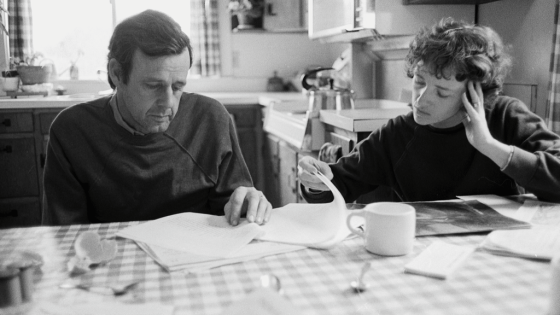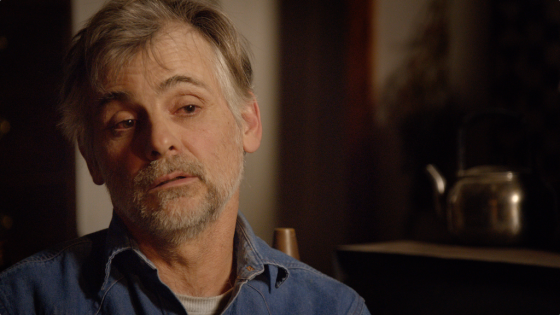New Documentary, “The Seer,” Looks Through the Eyes of Author Wendell Berry
It “will leave viewers not with a picture of a man but rather with a glimpse of what he sees.”
New Documentary, “The Seer,” Looks Through the Eyes of Author Wendell Berry
It “will leave viewers not with a picture of a man but rather with a glimpse of what he sees.”

The film, “The Seer: A Portrait of Wendell Berry,” directed by Laura Dunn and Jef Sewell (also the producer) and executive produced by Robert Redford and Terrence Malick, is as much a love letter to family farmers and the rural country, where Berry has deep family roots, as it is a straight-ahead portrait of the author.
Dunn, 40, felt a documentary about Berry needed to be more than a traditional head-on interview, interspersed with B roll. Early on, she was inspired by Berry’s 40-pane window for a way to present her subject. Like the painter Chuck Close‘s portraits, which are made up of small abstract units that together create a subject’s likeness, Dunn focused her camera on the landscape, people, and past to give us a deeper understanding of Berry’s life and works – so it’s not so much about Berry himself, but instead, what he sees around him.
The film is shot “across four seasons in the farming cycle … [and] blends observational scenes of farming life, interviews with farmers and community members with evocative, carefully framed shots of the surrounding landscape, according to the film’s website. In an unusual move for a documentary about a living person, the camera is never turned directly on its subject.
“It was clear to me through my conversations with Wendell – and reading his texts about computers, screens, and media – that this is a person who is very skeptical of screens, and as a filmmaker that’s a challenge,” says Dunn. “If you want to draw a portrait of someone, what you’re trying to do is capture in some small way some reflection of the essence of that person. With Wendell, it occurred to me early on that this couldn’t be a biopic. That wouldn’t capture the complexity of him in my mind.”

Seven years in the making, “The Seer” had its beginnings in one of Dunn’s earlier documentaries, 2007’s “The Unforeseen,” about the environmental impact of real-estate development in and around Austin, Texas. In that film, Berry reads from one of his poems, “Santa Clara Valley,” providing a haunting underpinning for the narrative. When Dunn finished “The Unforeseen,” she was inspired focus her next project on him, in part to bring more attention to his work, especially the groundbreaking 1977 nonfiction book The Unsettling of America.
“Terry [Malick] and Bob Redford [executive producers on “The Unforeseen”] got involved,” says Dunn. “They’re both big fans of Wendell Berry. It just took off from there. It started off with a lot of letter writing back and forth to Wendell, constantly negotiating and renegotiating terms about how to tell that story.”
Dunn considers The Unsettling of America to be “fundamental to our whole cultural thinking about agriculture and farming,” she says, and discovered while working on “The Seer” that Berry’s friends and neighbors, whom she interviewed, exemplified the themes of his book. She spoke to Steve Smith and Mark Roberts, for example, multigenerational farmers who grew tobacco, the area’s traditional main crop. Smith initially believed the mantra of “get big or get out” that the US government espoused in the early 1970s. But in the early 1990s, he began growing vegetables using biodynamic methods and started Kentucky’s first CSA. Roberts, on the other hand, still farms tobacco, along with corn, and soybeans on about 2,000 acres, says Dunn.
“[Roberts] is another great guy, another multigenerational family farmer in Henry County, but he bought into the idea that you have to get bigger and bigger and is still doing that,” she says. “He’s the other side of the story. He’s still living that industrial vision and is hurting badly.”

“The Seer” premieres at Austin’s South by Southwest festival in March. The team also launched a Kickstarter campaign to provide funds for the final post-production costs. In the meantime, listen to a portion of Dunn’s interview with Berry below:
Follow us

This work is licensed under a Creative Commons Attribution-NoDerivatives 4.0 International License.
Want to republish a Modern Farmer story?
We are happy for Modern Farmer stories to be shared, and encourage you to republish our articles for your audience. When doing so, we ask that you follow these guidelines:
Please credit us and our writers
For the author byline, please use “Author Name, Modern Farmer.” At the top of our stories, if on the web, please include this text and link: “This story was originally published by Modern Farmer.”
Please make sure to include a link back to either our home page or the article URL.
At the bottom of the story, please include the following text:
“Modern Farmer is a nonprofit initiative dedicated to raising awareness and catalyzing action at the intersection of food, agriculture, and society. Read more at <link>Modern Farmer</link>.”
Use our widget
We’d like to be able to track our stories, so we ask that if you republish our content, you do so using our widget (located on the left hand side of the article). The HTML code has a built-in tracker that tells us the data and domain where the story was published, as well as view counts.
Check the image requirements
It’s your responsibility to confirm you're licensed to republish images in our articles. Some images, such as those from commercial providers, don't allow their images to be republished without permission or payment. Copyright terms are generally listed in the image caption and attribution. You are welcome to omit our images or substitute with your own. Charts and interactive graphics follow the same rules.
Don’t change too much. Or, ask us first.
Articles must be republished in their entirety. It’s okay to change references to time (“today” to “yesterday”) or location (“Iowa City, IA” to “here”). But please keep everything else the same.
If you feel strongly that a more material edit needs to be made, get in touch with us at [email protected]. We’re happy to discuss it with the original author, but we must have prior approval for changes before publication.
Special cases
Extracts. You may run the first few lines or paragraphs of the article and then say: “Read the full article at Modern Farmer” with a link back to the original article.
Quotes. You may quote authors provided you include a link back to the article URL.
Translations. These require writer approval. To inquire about translation of a Modern Farmer article, contact us at [email protected]
Signed consent / copyright release forms. These are not required, provided you are following these guidelines.
Print. Articles can be republished in print under these same rules, with the exception that you do not need to include the links.
Tag us
When sharing the story on social media, please tag us using the following: - Twitter (@ModFarm) - Facebook (@ModernFarmerMedia) - Instagram (@modfarm)
Use our content respectfully
Modern Farmer is a nonprofit and as such we share our content for free and in good faith in order to reach new audiences. Respectfully,
No selling ads against our stories. It’s okay to put our stories on pages with ads.
Don’t republish our material wholesale, or automatically; you need to select stories to be republished individually.
You have no rights to sell, license, syndicate, or otherwise represent yourself as the authorized owner of our material to any third parties. This means that you cannot actively publish or submit our work for syndication to third party platforms or apps like Apple News or Google News. We understand that publishers cannot fully control when certain third parties automatically summarize or crawl content from publishers’ own sites.
Keep in touch
We want to hear from you if you love Modern Farmer content, have a collaboration idea, or anything else to share. As a nonprofit outlet, we work in service of our community and are always open to comments, feedback, and ideas. Contact us at [email protected].by Andrew Amelinckx, Modern Farmer
February 23, 2016
Modern Farmer Weekly
Solutions Hub
Innovations, ideas and inspiration. Actionable solutions for a resilient food system.
ExploreExplore other topics
Share With Us
We want to hear from Modern Farmer readers who have thoughtful commentary, actionable solutions, or helpful ideas to share.
SubmitNecessary cookies are absolutely essential for the website to function properly. This category only includes cookies that ensures basic functionalities and security features of the website. These cookies do not store any personal information.
Any cookies that may not be particularly necessary for the website to function and are used specifically to collect user personal data via analytics, ads, other embedded contents are termed as non-necessary cookies.